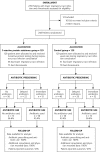Point-of-care C-reactive protein testing and antibiotic prescribing for respiratory tract infections: a randomized controlled trial
- PMID: 20212299
- PMCID: PMC2834719
- DOI: 10.1370/afm.1090
Point-of-care C-reactive protein testing and antibiotic prescribing for respiratory tract infections: a randomized controlled trial
Abstract
Purpose: Antibiotics are only beneficial for subgroups of patients with acute lower respiratory tract infections (LRTI) and rhinosinusitis in family practice, yet overprescribing for these conditions is common. C-reactive protein (CRP) point-of-care testing and delayed prescribing are useful strategies to reduce antibiotic prescribing, but both have limitations. We evaluated the effect of CRP assistance in antibiotic prescribing strategies-including delayed prescribing-in the management of LRTI and rhinosinusitis.
Methods: We conducted a randomized controlled trial in which 258 patients were enrolled (107 LRTI and 151 rhinosinusitis) by 32 family physicians. Patients were individually randomized to CRP assistance or routine care (control). Primary outcome was antibiotic use after the index consultation. Secondary outcomes included antibiotic use during the 28-day follow-up, patient satisfaction, and clinical recovery.
Results: Patients in the CRP-assisted group used fewer antibiotics (43.4%) than control patients (56.6%) after the index consultation (relative risk [RR] = 0.77; 95% confidence interval [CI], 0.56-0.98). This difference remained significant during follow-up (52.7% vs 65.1%; RR = 0.81; 95% CI, 0.62-0.99). Delayed prescriptions in the CRP-assisted group were filled only in a minority of cases (23% vs 72% in control group, P < .001). Recovery was similar across groups. Satisfaction with care was higher in patients managed with CRP assistance (P = .03).
Conclusions: CRP point-of-care testing to assist in prescribing decisions, including delayed prescribing, for LRTI and rhinosinusitis may be a useful strategy to decrease antibiotic use and increase patient satisfaction without compromising patient recovery.
Figures


References
-
- Hirschmann JV. Antibiotics for common respiratory tract infections in adults. Arch Intern Med. 2002;162(3):256–264. - PubMed
-
- Smucny J, Fahey T, Becker L, Glazier R, McIsaac W. Antibiotics for acute bronchitis. Cochrane Database Syst Rev. 2000;(4):CD000245. - PubMed
-
- Young J, De Sutter A, Merenstein D, et al. Antibiotics for adults with clinically diagnosed acute rhinosinusitis: a meta-analysis of individual patient data. Lancet. 2008;371(9616):908–914. - PubMed
Publication types
MeSH terms
Substances
LinkOut - more resources
Full Text Sources
Other Literature Sources
Medical
Research Materials
Miscellaneous
